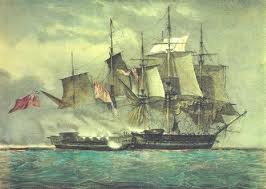I’ve been giving a great deal of thought to the historical PR that dominated the latter half of the twentieth century recently. In particular, the carefully fostered impression that the US and the UK were centuries’ long allies with a ‘special relationship’ and all that–a mindset that was, of course, born out of the vicissitudes of two World Wars…
It’s a thing I think about a great deal, actually. Because the research I’ve been doing over the last two to three years has taught me that 200 years ago, the opposite was true.
And this makes things–all kinds of things–a bit tricky, because whilst I write historical fiction and very much appreciate my American readership, I do try to mirror the attitudes and mores of those who lived in the Napoleonic period as closely as I can. And a great many of those attitudes and mores are simply not what my contemporary readers might expect or even approve of…
Equally, I’m often struck too by sets of circumstances which in one country led to one thing whilst in another these same sorts of events were glossed over or whitewashed.
Permit me to explain.
 On 5 March 1770, at the corner of King Street in Boston, Massachusetts, there was a bijou fracas-ette in which a mob of locals formed around a British sentry, giving him lip–was he a youngish lad? Frightened by being surrounded and harassed? Who knows? At any rate, this crowd of mouthie Bostonians were just getting warmed up with the verbal abuse and then they started lobbing things. Stones? Rotten tomatoes? Handfuls of muck?
On 5 March 1770, at the corner of King Street in Boston, Massachusetts, there was a bijou fracas-ette in which a mob of locals formed around a British sentry, giving him lip–was he a youngish lad? Frightened by being surrounded and harassed? Who knows? At any rate, this crowd of mouthie Bostonians were just getting warmed up with the verbal abuse and then they started lobbing things. Stones? Rotten tomatoes? Handfuls of muck?
At some point during the escalating row, another eight British troops joined our sentry, eventually firing into the crowd. Three people were killed outright; several others were wounded. And two more people later died of their wounds.
And this incident, also known as the Boston Massacre, is one of those seminal events that led directly to the American Revolution, proving as it did how viciously unfit and anti-liberty those nasty-wasty tyrants the British were. I mean, it was an absolute gift in the propaganda war promulgated by all sorts of fellows including Paul Revere and friends. And don’t we all cheer.
(It should be mentioned here that one officer, eight soldiers and four civilians were arrested, then charged with murder. Defended by John Adams, the lawyer and future president, six of the soldiers were acquitted, two were convicted of manslaughter and given the reduced sentence of being branded on their hand. Strangely, this part of the story is usually omitted by the pro-rebel propagandists…)
 Anyway, here’s the thing. I’ve been reading the biography of Field-Marshal Prince Blucher, the Prussian general who fought alongside Wellington at Waterloo, defeating Napoleon, as written by Blucher’s own Chief of Staff, General Gneisenau–so plenty of eye-witness accounting here.
Anyway, here’s the thing. I’ve been reading the biography of Field-Marshal Prince Blucher, the Prussian general who fought alongside Wellington at Waterloo, defeating Napoleon, as written by Blucher’s own Chief of Staff, General Gneisenau–so plenty of eye-witness accounting here.
And when discussing the independent city-state of Hamburg, known before 1810 (when Napoleon decided to annex it) as the Free and Hanseatic City of Hamburgh, Gneisenau writes:
“Enormous were the exactions which Napoleon imposed and levied; cruel and relentless the robberies and spoliations that were committed and justified by his Satraps so as utterly to destroy and undermine for a series of years, the opulence and prosperity of this venerable head of the House league…
“On the 24th February 1813, when the French authorities, both civil and military, made evident preparations to evacuate the place, and leave it to its fate, the populace were not backward in expressing their sentiments of freedom and detestation of their tyrants, both vehemently and loudly. The arms of Napoleon were torn down, and treated with every mark of contempt, the custom-house offices sacked and demolished, and several other acts of popular fury were committed.
“Six persons were, in consequence, arrested by order of General Carra St. Cyr, and dragged before a military tribunal; their trial was of the most summary kind, no witnesses were confronted, no counsel allowed, and, after a short hour of examination, they were sentenced to be shot as traitors, in having aided an insurrection…they were inhumanly hurried to the place of execution, and into eternity…Never were liberty, justice and the natural rights of mankind more flagrantly violated, than in this instance.
 “Such are some of the infamous deeds of a few of those flagitious miscreants and followers of Napoleon, who have wantonly stained with innocent blood every city, and every river, from the Scheldt to the Elbe, and from the Rhine to the Danube; evincing in all their actions a marked disdain and mockery of religion, and an avowed opposition to every thing sacred in the laws, customs, and governments of other countries.”
“Such are some of the infamous deeds of a few of those flagitious miscreants and followers of Napoleon, who have wantonly stained with innocent blood every city, and every river, from the Scheldt to the Elbe, and from the Rhine to the Danube; evincing in all their actions a marked disdain and mockery of religion, and an avowed opposition to every thing sacred in the laws, customs, and governments of other countries.”
Gneisenau also writes of Hamburgh: “An official and moderate estimate states the total amount of the losses caused to this city and its environs by d’Avoust [whom Gneisenau calls one of Napoleon’s Satraps] at thirteen millions sterling.
“The population was reduced from 120,000 to 40,000 souls; more than 1500 houses were either burnt or demolished; and by d’Avoust’s unnatural, stubborn, and vindictive cruelty, more than 1600 families were stripped of their bedding, furniture, and cattle, turned out to live under the canopy of heaven, in the midst of a severe winter, and, in short, became beggars on the high roads.”
I can also tell you that during this period the independent wealth and hard-earned prosperity of Hamburg was leveled to an unending prospect of lack, poverty and wretched unemployment: At the beginning of the Napoleonic wars Hamburg had over 400 sugar factories. By 1812, only 3 were left, the rest victims of the pernicious Continental System which prevented the importation of raw materials from outside Europe into any port under French control.
But, besides me and probably a handful of German historians, who knows of the wretched history of this wealthy vibrant city, the loss of their liberty and their lives, by acts such as this?
 Is it a cause celebre universally recognised as fuelling the fight for German liberation against Napoleonic despotism? Is there any recognition that atrocities and tyranny were the legacy of Napoleonic occupation across Europe, rather than being an aberration suffered only by the Spanish?
Is it a cause celebre universally recognised as fuelling the fight for German liberation against Napoleonic despotism? Is there any recognition that atrocities and tyranny were the legacy of Napoleonic occupation across Europe, rather than being an aberration suffered only by the Spanish?
I don’t think so. Quite the opposite even. And curiously, at the time that these events were unfolding 200 years ago, those sons of liberty in the fledgling United States (which had just fought with such ferocity against the tyranny of George III, under the banners of “No Taxation without Representation” and “Don’t Tread on Me”) were allies of Napoleonic France–that nation referred to by Gneisenau as “a brotherhood of butchers”.
Nor that one would know any of this if one were to visit Paris–a city I love, don’t get me wrong–for there, one encounters the PR-perfect image of Napoleon the just, Napoleon the liberator, Napoleon the airbrushed uber-hero with all his jolly, merry, urbane marshals and men. Quite the little imperial Robin Hood’s band, weren’t they?
Which therefore for me is a problem. Because that’s not what he was, that’s not who he was, and that’s not how his contemporaries saw him. At all.
And this was brought home to me rather forcefully in this letter, written by Horatio, Lord Nelson, hero of the Nile and Trafalgar, which recently went under the hammer…
 Nelson wrote: “I hate rebels, I hate traitors, I hate tyranny come from where it will. I have seen much of the world, and I have learnt from experience to hate and detest republics.
Nelson wrote: “I hate rebels, I hate traitors, I hate tyranny come from where it will. I have seen much of the world, and I have learnt from experience to hate and detest republics.
“There is nothing but tyranny & oppression, I have never known a good act done by a Republican, it is contrary to his character under the mask of Liberty. He is a tyrant, a many headed monster that devours your happiness and property. Nothing is free from this monster’s grasp. A republic has no affection for its subjects.
“A King may be ill advised and act wrong, a Republic never acts right, for a knot of villains support each other, and together they do what no single person dare attempt.
“I pray God this war was over and a monarch placed on the throne of France, not that I like any Frenchman be he royalist or be he republican, but the French republicans have shown themselves such villains. I form not my opinion, My Dear Lord, from others, no it is from what I have seen. They are thieves, murderers, oppressors and infidels, therefore what faith can we hold with these people.”
He is considered the consummate Englishman of the period, the hero for all time…
And that, and those views as expressed by him and by his Prussian and Russian contemporaries, those are what they really thought. No PR, no whitewash, no political correctness…
How will my modern readers cope?

















